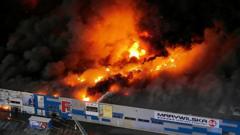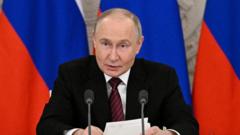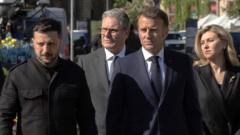Volodymyr Zelensky emphasized the necessity of a cease-fire prior to any talks with Vladimir Putin, while European leaders threaten new sanctions against Russia.
Zelensky Calls for Immediate Cease-Fire Amidst Russian Talks Proposal

Zelensky Calls for Immediate Cease-Fire Amidst Russian Talks Proposal
Ukraine's president insists on truce before engaging in direct discussions with Russia.
In a strategic response to Russia's offer for direct negotiations, Ukrainian President Volodymyr Zelensky insisted on a cease-fire as a prerequisite. On the morning of May 11, 2025, Zelensky acknowledged Russia's proposal for talks in Istanbul but highlighted his expectation for a cease-fire confirmation starting Monday. This call for peace comes after President Vladimir Putin rejected an earlier cease-fire initiative.
The tension escalated as leaders from France, Britain, Germany, and Poland visited Kyiv, providing a united front that urged Russia to accept a 30-day cease-fire by Monday or face further sanctions. In a conversation from Kyiv, these European leaders also indicated that the United States would take similar action against Russia if the proposal was ignored.
The dynamics of international relations have shifted as the Trump administration, since initiating its peace efforts three months ago, has aligned more closely with Russia, maintaining existing sanctions but refraining from introducing new measures. In contrast, Ukraine welcomed an American offer for an unconditional cease-fire in March, showing a willingness to pause hostilities.
Putin's late-night news conference expressed the Kremlin's desire for direct discussions with Ukraine, without acquiescing to the call for a cease-fire. According to Kremlin spokesmen, Russia's engagement in negotiations hinges on the cessation of arms supply to Ukraine from Western nations.
With both leaders articulating their positions, uncertainty looms regarding the prospect of peace in the region. The conditions set by Zelensky and Putin indicate a complex road ahead, as calls for reconciliation are counterbalanced by ongoing military confrontations and geopolitical ramifications.
The tension escalated as leaders from France, Britain, Germany, and Poland visited Kyiv, providing a united front that urged Russia to accept a 30-day cease-fire by Monday or face further sanctions. In a conversation from Kyiv, these European leaders also indicated that the United States would take similar action against Russia if the proposal was ignored.
The dynamics of international relations have shifted as the Trump administration, since initiating its peace efforts three months ago, has aligned more closely with Russia, maintaining existing sanctions but refraining from introducing new measures. In contrast, Ukraine welcomed an American offer for an unconditional cease-fire in March, showing a willingness to pause hostilities.
Putin's late-night news conference expressed the Kremlin's desire for direct discussions with Ukraine, without acquiescing to the call for a cease-fire. According to Kremlin spokesmen, Russia's engagement in negotiations hinges on the cessation of arms supply to Ukraine from Western nations.
With both leaders articulating their positions, uncertainty looms regarding the prospect of peace in the region. The conditions set by Zelensky and Putin indicate a complex road ahead, as calls for reconciliation are counterbalanced by ongoing military confrontations and geopolitical ramifications.




















